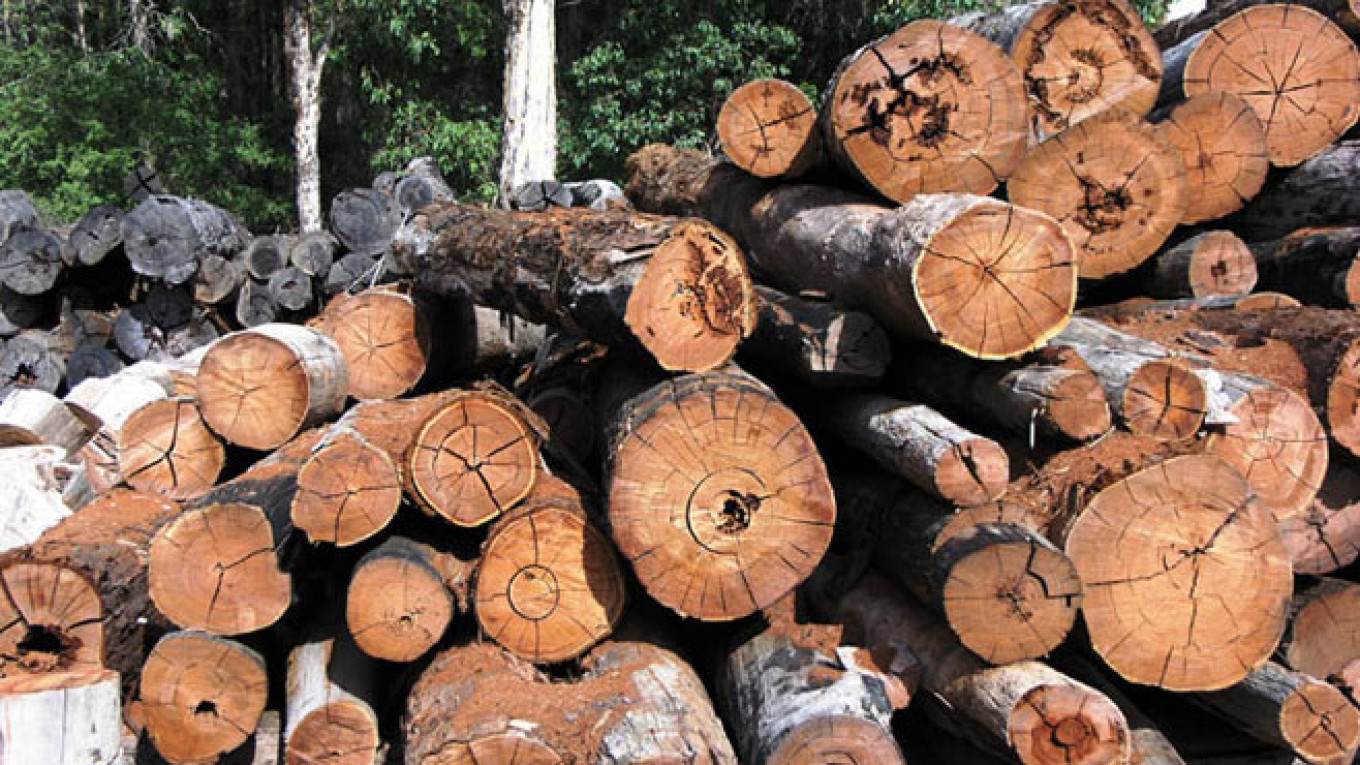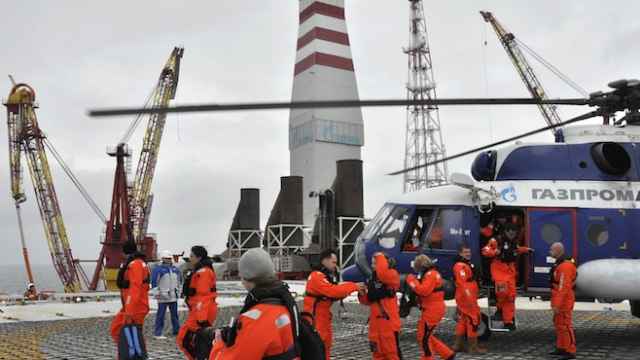It seems unfeasible that Russia, which holds a fifth of the planet's forests, could run out of wood.
And yet it is happening, at least with commercially usable forests, environmental analysts say.
The Russian logging industry will face lack of harvestable timber in 10 to 20 years, a short time by the standards of an industry naturally tied to slow tree growth cycles, according to their consensus.
"We are already past the point of no return," Konstantin Kobyakov, who oversees the protection of high conservation value forest at WWF Russia, told The Moscow Times.
To keep the logging industry on the rails, Russia needs to go from extensive to intensive forest management — i.e. from clearing forests once and moving to new territories to replanting them, industry players and officials agree.
But the process requires massive reform and multibillion-dollar investment that would take decades to recoup — neither of which is likely to materialize anytime soon, given Russia's flagging economy and dismally unstable investment climate.
"No one needs a crisis, but it looks like that is the only way we'll learn," Kobyakov said in a telephone interview earlier this month.
Too Far for Business
Russia had about 8.8 million square kilometers of forests as of 2010, according to a 2012 study by the UN Food and Agriculture Organization, or FAO.
This is 20 percent of the world's total and more than any other country. Brazil is second with some 5.1 million square kilometers.
But Russia only accounted for some 4 percent of the global logging output, the FAO study said.
Easily accessible forests in Russia are shrinking rapidly, said Artyom Savko, a spokesman for Ilim Group, Russia's biggest papermaker with an annual output of 2.6 million tons.
The Russian logging industry was thriving from the 1940s through the 1970s, mainly on forest reserves in the central European part of the country.
But those reserves are long depleted. In the northwestern Republic of Karelia, a former hotbed of the industry that housed more than a hundred logging settlements, only two such villages survive.
Russia's main sources of timber now are in Siberia, the Far East and the country's European North.
But the cost of shipping timber across hundreds and thousands of kilometers of roadless terrain can be too high to render logging profitable in large parts of those regions, said Savko, whose company's business is centered in the Arkhangelsk and Leningrad regions of northern European Russia and the Irkutsk region of eastern Siberia.
Russia lost about 10 percent of its remaining virgin forest in 2000-13, according to a study by Moscow-based NGO Transparent World.
Some forests cleared between 1940 and 1970 have actually regrown enough to be cleared again, said WWF's Kobyakov. But those offer mostly aspen or birch — which, despite being considered the archetypal national tree in Russia, is subpar timber compared with many conifers, which are in increasingly short supply, experts said.
"A sharp drop in output is inevitable in a decade or two," Kobyakov said. "How serious it will be depends on whether we start acting now."
Replant and Maintain
The Russian logging industry still follows mid-20th-century templates of extensive management, when loggers clear a forest and move on.
The state-of-the-art practice is intensive forest management, where trees are replanted and only partially harvested, allowing forests to recuperate.
Intensive forest management has the added benefit of yielding more timber — up to five to seven cubic meters of timber per hectare per harvesting session, compared with Russia's current average of 1.5 cubic meters, said Vladimir Dmitriyev, a spokesman for the Federal Forestry Agency.
"Everyone agrees we need to move on to intensive management," Dmitriyev said by telephone.
Russia in fact replants a lot — 8,700 square kilometers last year, an area roughly the size of Puerto Rico, according to official figures. But the replanted forests get almost no maintenance, which is crucial for producing commercially viable timber, said Dmitry Yaroshenko, head of the forest program at Greenpeace Russia.
Only 3 percent of replanted forests in Russia are maintained, said Kobyakov of WWF Russia. As a result, up to 60 percent of their trees wither and die, he said.
"Without maintenance, you're just burying the replanting money," he said.
Dmitriyev of the state forest agency admitted the lack of maintenance, saying the country simply does not have the budget for it.
Some of the agency's funds could be reallotted for maintenance, but that would make the forest authorities vulnerable to criticism, Yaroshenko said. If money is shifted to maintenance, it would mean a sharp drop in replanting figures in official reports with little immediate result to show for it.
And a state agency's effectiveness is evaluated on the strength of its annual figures — meaning that investing in the long-term process of maintenance would likely get officials who try it fired long before the strategy bears fruit, Yaroshenko said.
Funds, Equipment and Other Problems
The switch to intensive forest management is a massive and costly undertaking. Greenpeace estimates the cost for Russia at 100 billion to 120 billion rubles ($2.6 billion to $3.1 billion).
Not even Canada — Russia's closest comparison by type of forest — has completed the switch to intensive management yet, though it can better afford to delay because it has bigger reserves of commercially available forests than Russia, Yaroshenko said.
Regions where intensive foreign management prevails provided 21 million cubic meters of timber last year, of 11 percent of Russia's total output, according to WWF data.
The wider logging industry also operates on obsolete equipment dating back to Soviet times that requires a revamp — another costly enterprise, given that the cost of a single paper mill is about $1 billion.
Lack of qualified personnel is yet another problem, especially since the Kremlin pushed through a new Forestry Code in 2006 that disbanded most of Russia's 80,000-strong state forester corps.
Ilim Group is running its own education program in the Arkhangelsk region, but experts consulted for the story agreed the effort was not enough to supply personnel for the industry nationwide.
At least illegal logging is not the serious problem it is often believed to be, experts said. Despite widespread stereotypes, only about 1 percent of Russia's timber output is illegal produce, which has a minor impact on the industry, WWF's Kobyakov said.
Bad Climate for Forests
While nobody disputes that Russia must switch to intensive forest management, debate rages about who should foot the bill.
Ilim's Savko said in e-mailed comments that the industry needs incentives from the government, but Kobyakov said private enterprises must chip in as well.
"They want expenditures nationalized and revenues privatized," he said.
Dmitriyev of the Federal Forestry Agency said the state is trying to find a middle ground between environmentalists' and loggers' concerns, but gave little detail.
However, neither business nor the state look capable of funding any serious reform, given the economic situation: Russia has teetered on the brink of recession since the start of the year, and state revenue is shrinking.
The draft state budget for 2015 allots 32.9 billion rubles ($850 million) to the Federal Forestry Agency, a 3.5 percent increase from this year — not enough to even offset inflation, already at 7.7 percent since the start of this year, according to the Central Bank.
Moreover, the business climate in Russia is Arctic cold, thanks to a war of sanctions between Russia and the West over Moscow's meddling in Ukraine and the arrest this month of Vladimir Yevtushenkov, the billionaire owner of oil-to-telecoms conglomerate Sistema.
The arrest has been widely seen as a Kremlin-endorsed attempt to strip the billionaire of assets, highlighting the lack of guarantees for investors in the country. In a sign of plummeting confidence, capital outflow is officially forecast this year at between $90 billion and $120 billion, up from $63 billion this year.
All of which means that the already flagging logging industry — which employs 800,000 people nationwide — has little to look forward to, said Yaroshenko of Greenpeace.
"Companies are either scraping by to survive another year or pretending that everything is rosy in hopes of finding a sucker to sell their business to," he said.
Contact the author at [email protected]
A Message from The Moscow Times:
Dear readers,
We are facing unprecedented challenges. Russia's Prosecutor General's Office has designated The Moscow Times as an "undesirable" organization, criminalizing our work and putting our staff at risk of prosecution. This follows our earlier unjust labeling as a "foreign agent."
These actions are direct attempts to silence independent journalism in Russia. The authorities claim our work "discredits the decisions of the Russian leadership." We see things differently: we strive to provide accurate, unbiased reporting on Russia.
We, the journalists of The Moscow Times, refuse to be silenced. But to continue our work, we need your help.
Your support, no matter how small, makes a world of difference. If you can, please support us monthly starting from just $2. It's quick to set up, and every contribution makes a significant impact.
By supporting The Moscow Times, you're defending open, independent journalism in the face of repression. Thank you for standing with us.
Remind me later.







